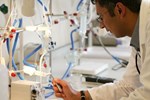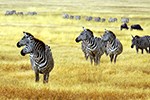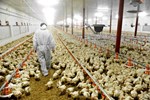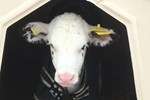Search - Research
381 - 390 of 430 results
-
New study reveals need for greater One Health understanding in antimicrobial resistance management
A new study from researchers at the Royal Veterinary College (RVC); Massey University; and AgResearch, a leading agricultural research institution in Aotearoa New Zealand, has found a need for greater engagement and collaboration between …A new study from researchers at the Royal Veterinary College (RVC); Massey University; and …
-
RVC to provide world-class training to more students thanks to government funding
UK Research and Innovation (UKRI) has announced new funding for the next five years to support collaborative PhD training via the London Interdisciplinary Doctoral Programme (LIDo), in the form of a new Doctoral Landscape Award. As a prominent …UK Research and Innovation (UKRI) has announced new funding for the next five years to support …
-
RVC research identifies new model for wildlife health management
Research from the Royal Veterinary College (RVC) has identified a new approach to assessing and managing health in wildlife populations. Taking learnings from well-established practices in managing livestock, this proposed model will help more …Research from the Royal Veterinary College (RVC) has identified a new approach to assessing and …
-
RVC awarded international grant to further research into equitable and sustainable livestock and food systems
The Royal Veterinary College (RVC) has been awarded more than USD $339,160 from the Tiny Beam’s Kindling Initiative grant to continue Critical Research on Industrial Livestock Systems (CRILS) Network. CRILS aims to support and advocate for just and …The Royal Veterinary College (RVC) has been awarded more than USD $339,160 from the Tiny Beam’s …
-
New RVC research reveals extent and progression of bovine respiratory disease in UK dairy calves
New research from the Royal Veterinary College (RVC), combining thoracic ultrasound alongside the measurement of clinical signs, has revealed that nearly a third of calves in the UK experience bovine respiratory disease and subclinical pneumonia. …New research from the Royal Veterinary College (RVC), combining thoracic ultrasound alongside the …
-
A study to establish canine and feline 95% reference intervals for the QMHA Radiometer ABL800 FLEX machines
Background: The Radiometer machines in the Emergency Room and the Intensive Care Unit of the QMHA are used multiple times every day to measure blood gases and biochemical parameters in dogs and cats within the hospital, however, canine and feline … -
New research by the RVC finds promising treatment for sclerosteosis patients
New research from the Royal Veterinary College (RVC) has identified porcupine inhibition – a strategy that blocks a key bone-related signalling pathway (Wnt) – as a promising pharmacological treatment for severe sclerosteosis. Sclerosteosis is an …New research from the Royal Veterinary College (RVC) has identified porcupine inhibition – a …
-
New research from the RVC reveals differing views on improving UK broiler (meat) chicken welfare
New research from the Royal Veterinary College (RVC) has found economic costs, environmental impacts, and misalignment between consumer purchasing and understanding are key reasons for the limited shift of UK chicken meat production to higher …New research from the Royal Veterinary College (RVC) has found economic costs, environmental …
-
New research from the RVC highlights pandemic risks posed by evolving swine flu viruses in Europe
A new study led by the Royal Veterinary College (RVC) has revealed significant genetic and antigenic diversity in European swine influenza viruses, raising the critical need for pandemic preparedness and vaccine effectiveness in both animal and …A new study led by the Royal Veterinary College (RVC) has revealed significant genetic and …
-
Study shows veterinary sector continues to face persistent prevalence of racism
A new study from the Royal Veterinary College (RVC), London South Bank University and the British Veterinary Ethnicity and Diversity Society, has found racism continues to be a persistent problem experienced by Black, Asian and Minority Ethnic (BAME) …A new study from the Royal Veterinary College (RVC), London South Bank University and the British …









